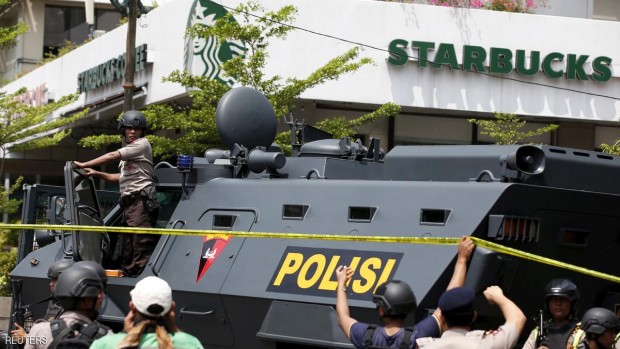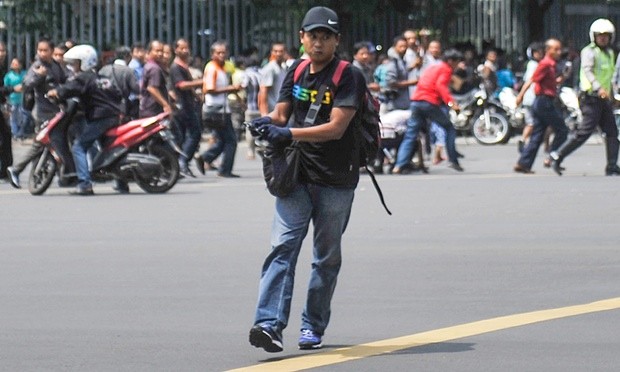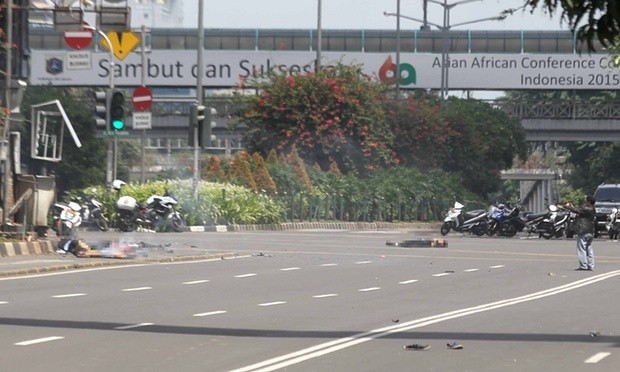Death toll hits 7 in Jakarta suicide attacks
The Guardian
Armoured personnel carriers called onto the streets amid explosions and gunfights in one of city’s busiest precincts

Up to seven blasts and multiple gunfights hit the Indonesian capital Jakarta on Thursday, including one outside the United Nations building in the centre of the capital, leaving at least seven people dead.
Images from the one of the city’s busiest precincts showed a small police booth in the middle of one of Jakarta’s main roads, twisted by an explosion with three bodies lying in the street. Another shot showed smoke rising in front of a Starbucks cafe.
Jakarta police spokesman Colonel Muhammad Iqbal said seven people including five attackers were killed, adding that the gun battle took place in a cinema housed in the same building as the Starbucks.
The local Metro TV said 14 gunmen were involved in the attack, which started around 10.30am local time (2.30am GMT). Police declared the attack over shortly after 3pm local time (8am GMT).
There were reports that as many as six attackers had remained inside. Police said four suspected attackers had been arrested.
Risky Julianti, 25, a sales promoter at the Sarinah Mall, had just arrived at work and was changing into her uniform when the first explosion went off. She said she heard at least five more blasts and saw three people dead. “The building was shaking heavily when the blast happened. An office boy shouted ‘bomb, bomb’ and we quickly ran out to a church nearby,” she told the Guardian.
“I was very panicked and I was crying. We heard the blasts as we were running to the church.”

A UN regional representative, Jeremy Douglas, said he was getting out of his car by the UN office when a “massive bomb” detonated.
“Chaos & we’re going into lock-down,” he said on Twitter. “Apparent suicide bomber literally 100m from the office and my hotel. Now gunfire,” he adding, saying that he heard six explosions and an ensuing gunfight between police and the attackers.
Serious exchange of fire in downtown #Jakarta. Didn't experience this in 3.5 years in #Pakistan
— Jeremy Douglas (@jdouglasSEA) January 14, 2016
Edward Rees, a UN worker based in Pakistan who was visiting Jakarta, told the Guardian his colleagues in the Jakarta office heard the explosion. “They are holed up in the office awaiting instructions on what to do next.”
No group immediately claimed the attack. Helicopters circled above andarmoured vehicles entered the area, an upscale neighbourhood where there are luxury hotels and embassies that was cordoned off by the police.
“We have previously received a threat from Islamic State that Indonesia will be the spotlight,” police spokesman Anton Charliyan told journalists. But he added that police did not yet know who was responsible.
Indonesian president Joko “Widodo said in a statement on national TV that the situation was under control and called on people to remain calm. “The state, nation and people should not be afraid of, and lose to, such terror acts,” he said.
It is estimated that 500 to 700 Indonesians have joined the Islamic State group in Iraq and Syria and the government has expressed concern their return home could spark attacks. Separatist groups also operate in the country.
Yohanes Sulaiman, a lecturer and political analyst at Universitas Jendral Achmad Yani, said that while it was too early to say who was responsible, Indonesian police might have missed the ploy “because this is a new cell, probably radicalised young men and then exposed to Isis propaganda.”
He speculated that the attackers came from a newly created organisation as the assault was “amateurish because their target is unclear, and if reports are right, they are supposed to get in the mall, but stopped, asked to go to the police post, then opened fire.”

Indonesia suffered its deadliest attack in 2002, when 202 people were killed in three bomb attacks in the tourist hotspot Bali. Several members of Jemaah Islamiyeh, a violent Islamist militia, were convicted.
Major bomb attacks by extremist groups followed until 2009 when a crackdown weakened their operations. The emergence of Islamic State in Syria and Iraq has raised concerns that the networks will be reinforced.
Authorities have increasingly raise alerts after multiple bomb threats last year.
Police said they foiled a major plot with the arrest of several men allegedly linked to planned suicide bombings in the capital during New Year’s Eve celebrations. Raids across a number of cities led to the seizure of bomb making materials and a flag similar to the Islamic State emblem.
Up to 150,000 police and soldiers were deployed across the country on the last day of the year.
As the world’s most populous Muslim-majority country, Indonesian religious and civil society organisations have stepped up campaigns to fight the spread of violent extremism.
Neighbouring Malaysia and the Philippines have also focused resources on battling Islamic State, which hopes to spread its influence through partnering with domestic militias abroad.
How to submit an Op-Ed: Libyan Express accepts opinion articles on a wide range of topics. Submissions may be sent to oped@libyanexpress.com. Please include ‘Op-Ed’ in the subject line.
- Libya’s HCS invites applicants for key state roles - December 31, 2023
- UK calls on Iran to prevent escalation in Israel-Hamas conflict - November 05, 2023
- Libyan Interior Minister: Immigrant shelter costs a fortune - November 05, 2023


